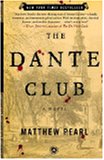On weekends, when I have control of the remote, I like to watch the Food Network. I’m not a gourmet cook. I don’t really even like cooking much (even though I’m a pretty good cook). I do enjoy watching others make something good. I used to really enjoy watching the Cajun Chef, Justin Wilson. Now my favorite is Michael Chiarello. He makes the yummiest looking food for his parties. How does one get invited to one of those? I just found out today you can visit his website and order some of the obscure products he uses on his show — like gray salt. You can also browse recipes!
After Michael Chiarello’s show, there’s a double-block of Bobby Flay — Boys Meets Grill and BBQ with Bobby Flay. He did a show a few weeks ago on which he made this fabulous looking Mojito Limeade.
Watching these shows and browsing the websites make me wish I liked cooking.


 Dan Brown wrote the book jacket blurb that appears on the cover of
Dan Brown wrote the book jacket blurb that appears on the cover of 
